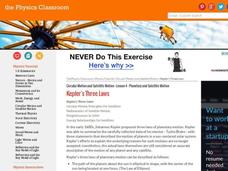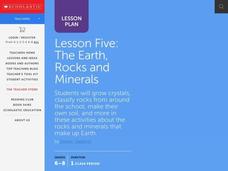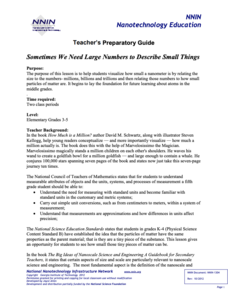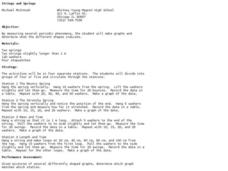Curated OER
Goldilocks and the Three Bears
Students read and discuss the story "Goldilocks and the Three Bears" and design a structure that will withstand a clay bear's force sitting on it. They develop a list of activities that the three bears do that real bears can't do, and in...
PhET
Wave on a String
The sound waves of thunder are made when lightning very quickly heats the air surrounding it, expanding faster than the speed of sound. Learners explore waves through their own movement of string or set waves to constantly oscillate....
It's About Time
Sounds in Strings
How many of your pupils play an instrument? A musical science lesson will help all of them understand how string instruments work. Young scientists construct a string-and-pulley system to test frequency and pitch. The lesson...
Curated OER
Physical Science: The Three Billy Goats Gruff
Explore science through problem solving and learning how to solve the problem of the story "The Three Billy Goats Gruff." Young investigators will learn how to construct a model and design a solution. They will also keep records of their...
Physics Classroom
Kelper's Three Laws
A flipped classroom lesson introduces astrophysics fanatics to Kepler's three laws of planetary motion. After reading about the laws of ellipses, equal areas, and harmonies, and also learning how Newton's gravitation concepts come into...
Curated OER
Basic Needs of Living Things - Lesson One
An interesting way of teaching about basic needs of different organisms awaits your fourth graders. Pupils take part in class discussions and demonstrations which should lead to a greater understanding of how to determine basic needs. As...
Scholastic
Lesson Five: The Earth, Rocks and Minerals
Apply the principles of geology to a series of collaborative, hands-on class activities. Young earth scientists learn more about igneous, metamorphic, and sedentary rocks before classifying and weathering rocks that they find....
Curated OER
Feel the Vibrations
How does sound travel in a string walkie-talkie? Third graders read about the way vibrations act between two cups and a string. Next, they put the steps in order, and experiment with their own walkie-talkies.
Curated OER
How Tall is that Tree?
Students use their feet to measure distance between themselves and a tree trunk. In this distance lesson, students use the number of steps, and string to measure distances and height of the tree. Students can get the tree...
National Park Service
Subalpine Web
The theory of keystone species in an ecosystem was first established in 1969 by Robert T. Paine. Pupils open the final lesson in a five-part series with a game guessing which member of the alpine ecosystem they are based on clues. After...
University of Texas
Free-Body Diagram
Preparing for an AP test is about more than bubble sheets and memorization. The two activities in this resource require a direct application of skills learned throughout an AP Physics course.
Curated OER
Riding on a Pendulum
A comprehensive resource gets fourth grade physical scientists making observations about the period of a pendulum and then applying knowledge to a playground swing. Through seven different stations, they will record observations and...
American Chemical Society
Heat, Temperature, and Conduction
How does heat move from one item to another, even when the items are in different states of matter? Pupils experiment with adding washers to hot water and adding hot washers to room temperature water to observe the heat transfer.
American Chemical Society
Changing the Density of an Object - Adding Material
In this sixth of seven activities revolving around the concept of density, physical science fans figure out if anything can be done to change the density of an object. Demonstrate by placing a can of regular and a can of diet soda into a...
Curated OER
String Telephone
Learners construct a string telephone. For this communications lesson, students use a cup, lead pencil, and a piece of string to construct a string telephone. The learners test their telephone with a classmate.
Curated OER
Muscular and Skeletal Systems
How do muscles move bones? Find out using a built-in-class model. Pupils construct a hand model with paper and string, then follow a series of directions to explore the movement process. Discover additional information about the muscular...
Curated OER
String Telephones and Musical Straws
Fourth graders investigate pitches of sound. In this physical science lesson, 4th graders participate in two activities that help them explore pitch--one activity has them working with string telephones and the amount of tension...
Curated OER
Concept Application: One to One Correspondence of Objects
Students consider the comparative sizes of the planets in the solar system. In this scale lesson, students select balls of different sizes to represent the planets in the solar system.
Virginia Department of Education
Adaptation and Evolution
Um may be the atomic symbol for confusion, but it won't be needed in this lesson. Scholars rotate through seven stations completing experiments, hands-on activities, writing exercises, and analysis. Stations include material on...
NASA
Newton Car
If a car gets heavier, it goes farther? By running an activity several times, teams experience Newton's Second Law of Motion. The teams vary the amount of weight they catapult off a wooden block car and record the distance the...
American Institute of Physics
Dr. Gates and the Nature of the Universe
What do Russian nesting dolls have to do with physics? They make a great demonstration tool for explaining Dr. Sylvester James Gates, Jr.'s string theory to young scientists. A two-part lesson first introduces learners to Dr. Gates'...
National Nanotechnology Infrastructure Network
Sometimes We Need Large Numbers to Describe Small Things
String the class along to help them understand large numbers. A multi-disciplinary lesson uses literature, science, and math to look at very large numbers. Pupils conceptualize how much a million is using literature before performing a...
Concord Consortium
Factors Affecting London Dispersion Attractions
How can non-polar molecules be attracted to one another? Introduce the phenomenon of London dispersion forces to young chemists through an entertaining interactive. Pupils choose from a variety of molecular shape combinations, then pull...
Curated OER
Strings and Springs
Ninth graders explore physics with springs and strings. In this force and motion lesson plan, 9th graders rotate through four stations exploring how various springs stretch and bounce, and how mass and length affect a pendulum's swing....























